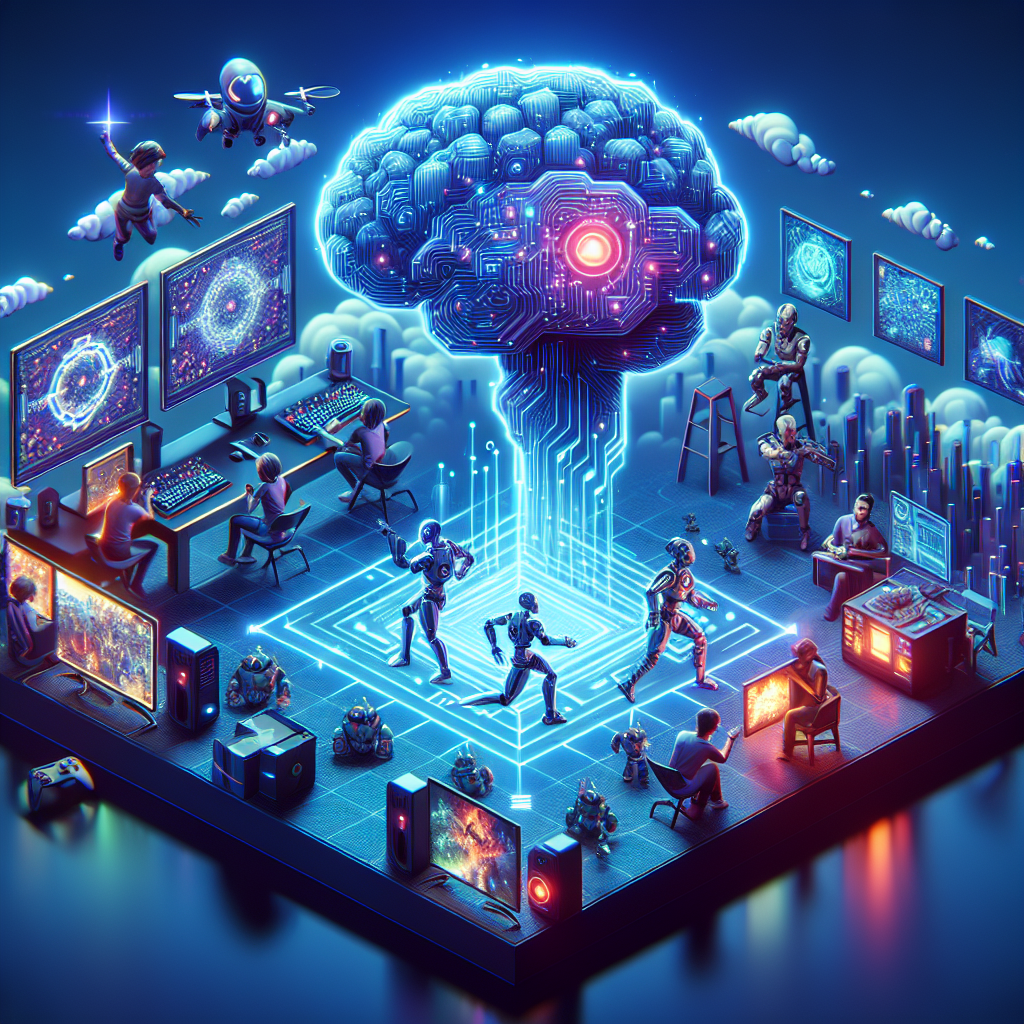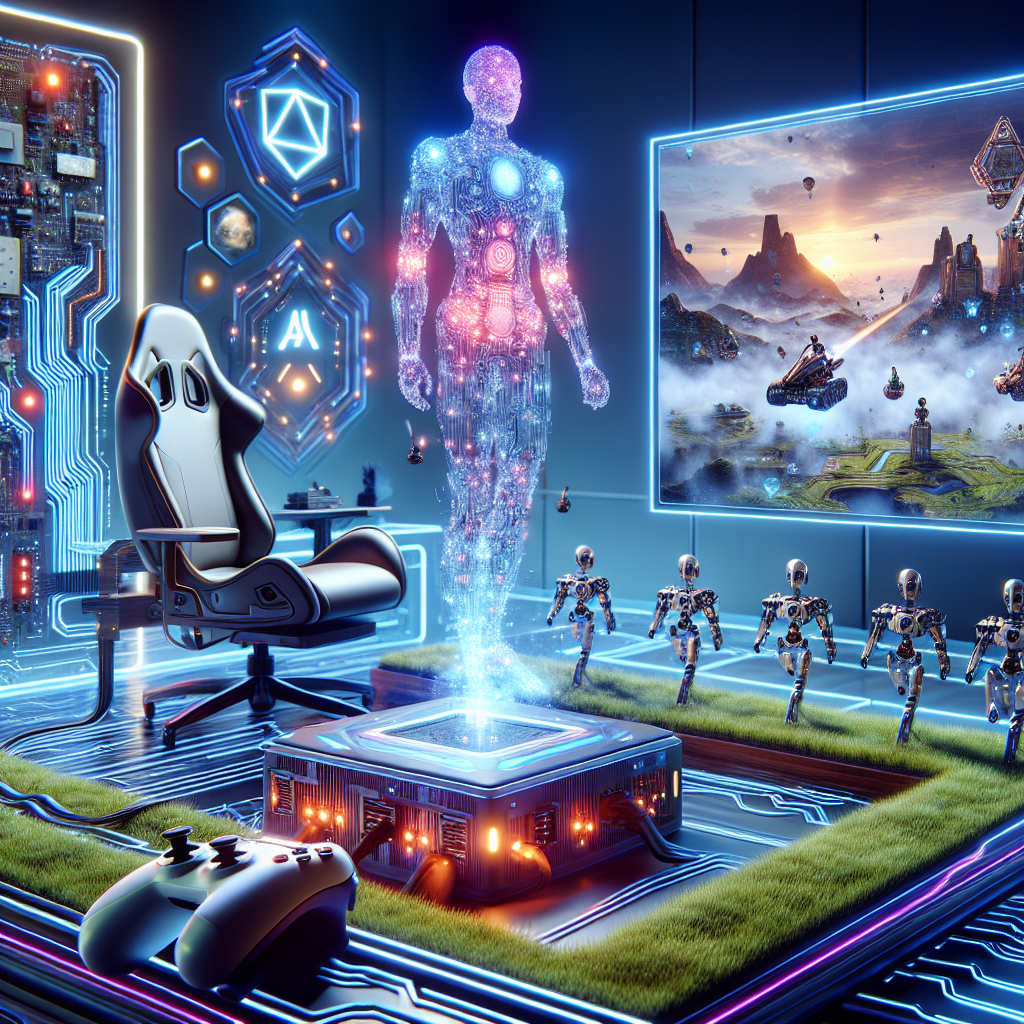Imagine a world where the characters in your favorite video games can think, learn, and adapt just like real people. This is where the incredible world of Artificial Intelligence (AI) in gaming comes into play. AI, short for Artificial Intelligence, refers to the simulation of human intelligence in machines that are programmed to imitate human tasks. When it comes to gaming, AI brings an unprecedented level of realism and challenge, making the gaming experience more thrilling and immersive than ever before. But what exactly is AI in gaming, and how does it enhance our gameplay? Let’s explore this fascinating concept and unlock the secrets behind its revolutionary impact. AI in gaming refers to the implementation of artificial intelligence techniques and algorithms in the development and operation of video games. It involves creating intelligent virtual entities, also known as non-player characters (NPCs), that can mimic human-like behavior and make decisions based on various factors. The evolution of AI in gaming has transformed the gaming industry, bringing new levels of realism, immersion, and complexity to gaming experiences. AI is not only important for enhancing gameplay, but also for game design, level creation, and creating believable opponents and teammates.
-
Non-Player Characters (NPCs): NPCs are virtual entities controlled by AI that interact with players in a game. They can take on various roles, such as enemies, allies, or neutral characters. These NPCs are programmed to make decisions based on predefined rules and algorithms, providing a dynamic and challenging gaming experience. They can exhibit behaviors such as attacking, defending, strategizing, or even adapting to the player’s actions.
-
Adaptive AI: Adaptive AI refers to AI systems that can learn and adapt from player behavior. These AI algorithms can analyze the actions and decisions made by players and adjust their strategies accordingly. This allows for a more personalized gaming experience, where the game responds to the player’s skills, weaknesses, and preferred playing style.
-
Dynamic AI: Dynamic AI focuses on creating NPCs that can dynamically react to changing game environments and player actions. These intelligent entities can assess their current situation, evaluate the game state, and choose the most appropriate course of action in real-time. This adds a layer of unpredictability and realism to the gameplay, making each playthrough unique and engaging.
-
Scripted AI: Scripted AI involves pre-programming specific behaviors and actions for NPCs to follow. These scripts dictate the actions and responses of characters in the game, creating a predetermined set of behaviors and interactions. While scripted AI can limit the flexibility and adaptability of NPCs, it is often used to create memorable and story-driven gaming experiences.
-
Learning AI: Learning AI refers to AI algorithms that can improve their performance over time through machine learning techniques. These algorithms use historical player data to learn and adjust their behavior, making them more challenging and engaging opponents. Learning AI can adapt to player strategies, find weaknesses, and provide a more realistic and immersive gaming experience.
-
Rule-Based AI: Rule-based AI relies on predefined rules and conditions to determine NPC behavior. These rules provide a set of instructions that dictate how NPCs should react and behave in different situations. Rule-based AI is often used to create predictable and consistent behaviors in NPCs and ensure they adhere to specific game mechanics and objectives.
AI in gaming has numerous applications that go beyond simply enhancing gameplay:
-
Game Design and Level Creation: AI can assist in game design and level creation by automatically generating game environments, layouts, and obstacles. It can save developers time and effort by automating the creation process and ensuring a balance between challenge and enjoyment for players.
-
Virtual Opponents and Teammates: AI can create virtual opponents and teammates that offer realistic and challenging gameplay experiences. These AI-controlled characters can adapt their strategies and behavior based on the player’s actions, making each encounter feel unique and challenging.
-
Procedural Content Generation: Procedural content generation refers to the use of AI algorithms to generate game content dynamically. This includes creating random maps, quests, items, and even narratives. Procedural content generation can provide an endless variety of gameplay experiences, keeping players engaged and entertained.
-
Player Behavior Analysis: AI can analyze and interpret player behavior, providing valuable insights to game developers. This information can be used to improve game mechanics, balance difficulty levels, and create more engaging and enjoyable experiences for players.
-
Pathfinding and Navigation: AI algorithms can be used to create efficient pathfinding and navigation systems for NPCs. This allows them to navigate complex game environments, avoid obstacles, and respond to changing conditions. This enhances the realism and immersion of the game world.
-
Realistic Graphics and Physics: AI techniques can be used to improve the visual and physical aspects of games. This includes creating realistic graphics, physics simulations, and animations. AI can optimize rendering processes, enhance lighting effects, and create lifelike character movements, contributing to more immersive and visually stunning gaming experiences.
Various AI techniques are employed to power AI in gaming:
-
Decision Trees: Decision trees are graphical models that represent the decisions, outcomes, and potential paths in a game. AI algorithms can use decision trees to determine the best course of action based on different conditions and player inputs. Decision trees allow for complex decision-making processes and provide a foundation for AI behavior in games.
-
Neural Networks: Neural networks are AI models inspired by the human brain. They are capable of learning and recognizing patterns, making them suitable for tasks such as character recognition or behavior prediction. Neural networks can be used to create realistic and adaptive AI in games, enabling NPCs to learn and respond to player actions.
-
Genetic Algorithms: Genetic algorithms mimic the process of natural selection to optimize certain aspects of games, such as character attributes or game balancing. These algorithms simulate the evolution of populations of potential solutions and iteratively improve them over time. Genetic algorithms can be used to create balanced and challenging gameplay experiences.
-
Expert Systems: Expert systems are AI models that mimic the expertise and decision-making processes of human experts in a specific domain. In gaming, expert systems can be used to create AI opponents that possess advanced strategies and tactics, providing a more challenging experience for players.
-
Fuzzy Logic: Fuzzy logic is a mathematical framework used to represent and process uncertain or imprecise information. In gaming, fuzzy logic can be used to create more realistic and natural NPC behaviors. It allows for more nuanced decision-making and enhances the believability of virtual entities.
AI in gaming also faces several challenges:
-
Performance Resource Constraints: AI algorithms can be computationally intensive and require significant processing power. This can pose challenges for game developers, as they need to ensure that AI functions smoothly without impacting game performance or causing lag.
-
Balancing Difficulty Levels: Creating AI opponents that provide an appropriate level of challenge can be challenging. Developers must strike a balance between creating opponents that are too easy to defeat and opponents that are too difficult, ensuring an enjoyable and engaging gaming experience for players.
-
Creation of Believable NPCs: Creating NPCs that exhibit believable behavior and realistic interactions with players can be a complex task. NPCs need to respond appropriately to player actions, display emotions, and communicate effectively, enhancing the player’s immersion in the game world.
-
Continuous Learning and Adaptation: AI algorithms that learn and adapt in real-time require access to large datasets and constant updates. Developers must ensure that learning AI algorithms have access to the necessary resources and data to continually improve their performance.
-
Ethical Considerations: AI in gaming raises ethical concerns related to player privacy, data collection, and potential biases in AI algorithms. It is important for developers to consider these ethical considerations and implement safeguards to protect player rights and prevent unfair or discriminatory practices.
The future of AI in gaming looks promising:
-
Enhanced Gaming Experience: AI will continue to enhance the overall gaming experience by creating more immersive worlds, realistic characters, and engaging gameplay. As AI technology advances, games will become more interactive and responsive to player actions, providing a higher level of enjoyment and satisfaction.
-
Real-Time Learning AI: Real-time learning AI algorithms will become more prevalent, allowing NPCs to adapt and learn from player behavior on the fly. This will create more challenging and dynamic opponents, making each gaming session unique and unpredictable.
-
Integration of Virtual Reality: The integration of AI with virtual reality (VR) technology will revolutionize gaming experiences. AI-powered VR games will offer highly realistic and immersive environments, interactions, and gameplay, transporting players to new worlds and providing unparalleled levels of immersion.
-
AI-Generated Content: AI algorithms will play a significant role in generating game content, including maps, quests, and narratives. This will enable developers to create vast and diverse game worlds that are procedurally generated and offer endless possibilities for exploration and discovery.
-
Advanced Behavioral Models: AI will continue to evolve in terms of modeling human behavior and emotions. NPCs will exhibit more realistic and nuanced behaviors, allowing for deeper immersion and emotional connections with virtual characters.
In conclusion, AI in gaming encompasses the implementation of artificial intelligence techniques and algorithms to enhance various aspects of games. It has revolutionized the gaming industry, bringing new levels of realism, complexity, and immersion to gaming experiences. With the evolution of AI, we can expect to see more advanced and sophisticated AI systems that create personalized, challenging, and realistic gaming experiences. The future of AI in gaming holds great potential, promising enhanced gameplay, real-time learning, integration with virtual reality, AI-generated content, and advanced behavioral models.

